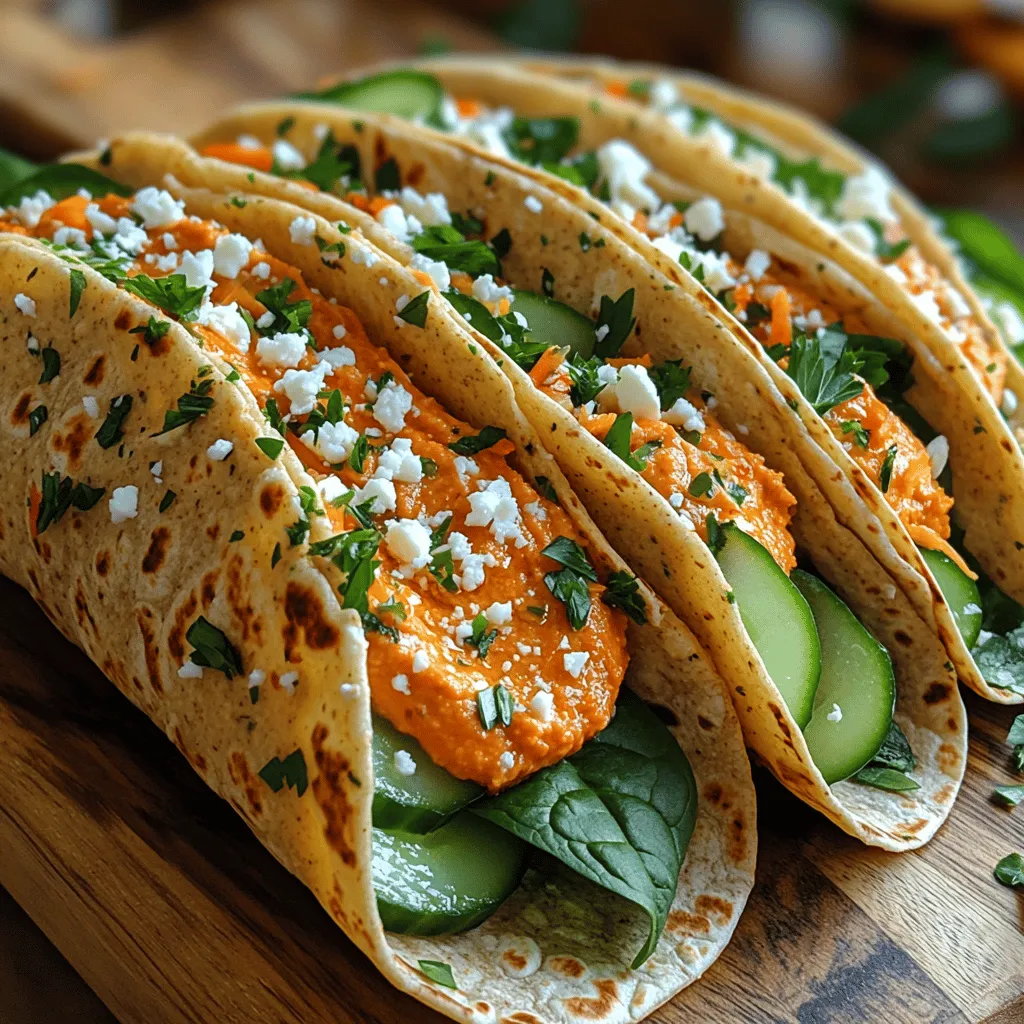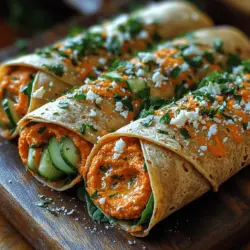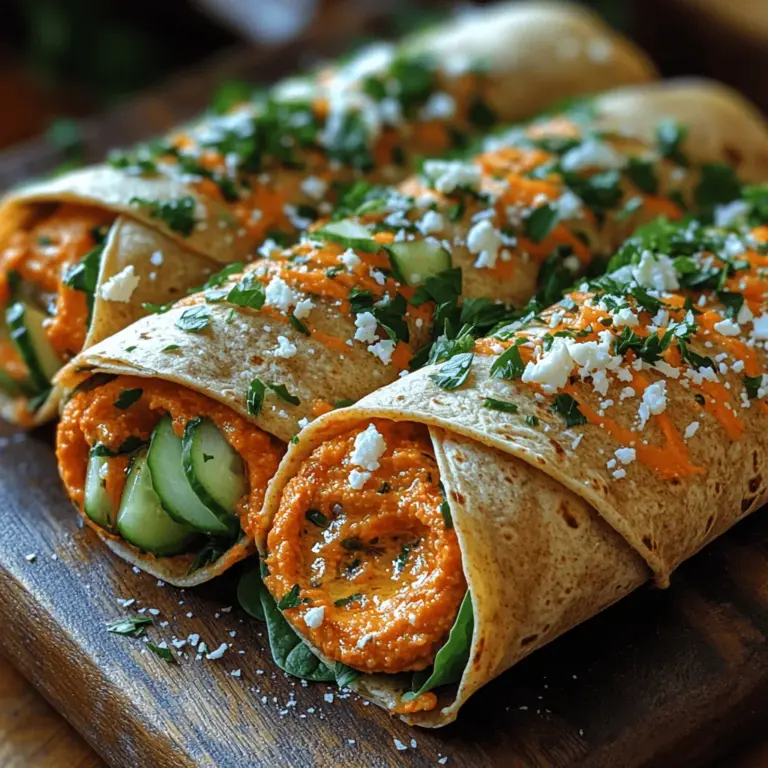When it comes to quick, healthy meals that don’t compromise on flavor, Roasted Red Pepper Hummus Wraps stand out as a top choice. This vibrant dish marries the rich, smoky taste of roasted red peppers with the creamy texture of hummus, all wrapped up in a convenient, portable form. Perfect for lunch, snacks, or even light dinners, these wraps offer a delightful way to incorporate more plant-based ingredients into your diet.
In this article, we will explore the origin of Roasted Red Pepper Hummus Wraps, the nutritional benefits of their main ingredients, and provide a detailed guide on how to prepare and assemble these delicious wraps. Whether you’re a seasoned chef or a kitchen novice, this recipe is both accessible and satisfying, making it an excellent addition to your culinary repertoire.
Understanding the Ingredients
To craft the perfect Roasted Red Pepper Hummus Wraps, we must first understand the star ingredients that contribute to both flavor and nutrition. Each component plays a vital role, and knowing their benefits can enhance your appreciation for this delightful dish.
The Foundation of Flavor: Roasted Red Peppers
Roasted red peppers are not just a beautiful addition to your wraps; they are the heart of this recipe. These peppers are typically sweet with a hint of smokiness, which elevates the overall flavor profile of the hummus.
Exploring the Benefits of Roasted Red Peppers
Roasted red peppers are packed with vitamins A and C, which are essential for maintaining a healthy immune system and good vision. They are also rich in antioxidants, which help combat oxidative stress in the body. The roasting process enhances their sweetness and makes them incredibly versatile, allowing them to blend seamlessly into various dishes.
Choosing Between Jarred and Homemade Options
When it comes to selecting roasted red peppers, you have two primary options: jarred or homemade. Jarred roasted red peppers are convenient and readily available in most grocery stores, making them a time-saving choice. However, if you have the time and want to control the flavor, roasting your own peppers can yield a fresher taste. To roast peppers at home, simply place them under a broiler until the skins char, then let them steam in a covered bowl before peeling off the skins.
Nutritional Powerhouse: Chickpeas
Chickpeas, or garbanzo beans, are a staple in Mediterranean and Middle Eastern cuisines and form the base of traditional hummus. Their creamy texture and nutty flavor make them an excellent choice for this recipe.
Overview of Chickpeas as a Superfood
Rich in protein, fiber, and essential vitamins, chickpeas are often hailed as a superfood. They are an excellent source of plant-based protein, making them a fantastic addition to vegetarian and vegan diets. Chickpeas also contain complex carbohydrates, which help maintain stable energy levels throughout the day.
Nutritional Benefits of Incorporating Chickpeas into Your Meals
In addition to their protein content, chickpeas are high in fiber, which promotes digestive health and helps you feel full longer. They are also a good source of minerals such as iron, magnesium, and phosphorus, contributing to overall health and well-being.
Creamy Texture: Tahini and Olive Oil
Tahini and olive oil are essential components that give the hummus its creamy texture and rich flavor.
The Role of Tahini in Hummus
Tahini, a paste made from ground sesame seeds, is a key ingredient in hummus. It adds a unique nutty flavor and contributes to the smooth texture that makes hummus so appealing. Beyond flavor, tahini is also rich in healthy fats, protein, and various vitamins and minerals.
Health Benefits of Olive Oil
Extra virgin olive oil is renowned for its heart-healthy properties. Packed with monounsaturated fats, it can help reduce bad cholesterol levels and lower the risk of heart disease. Additionally, olive oil is rich in antioxidants and anti-inflammatory compounds, making it a smart choice for enhancing both flavor and health.
The Zesty Touch: Garlic and Lemon Juice
Garlic and lemon juice are what elevate the flavor of roasted red pepper hummus, giving it a zesty kick.
Importance of Garlic in Flavor Enhancement
Garlic is a culinary staple known for its pungent aroma and distinctive taste. It adds depth to the hummus and has numerous health benefits, including antibacterial properties and potential cardiovascular benefits. The allicin compound in garlic is responsible for these health benefits, making it a worthy addition to your wraps.
Health Benefits of Lemon Juice in Cooking
Freshly squeezed lemon juice not only brightens the flavor of hummus but also adds a refreshing tang. It is an excellent source of vitamin C, which supports the immune system and acts as an antioxidant. Lemon juice can also aid digestion and help enhance iron absorption from plant-based foods, making it an essential component of this recipe.
Seasoning to Perfection: Salt and Black Pepper
To ensure that your roasted red pepper hummus is flavorful, proper seasoning is necessary.
How to Season Hummus Properly for Optimal Flavor
Salt and black pepper are the final touches that bring the entire dish together. It’s important to add these ingredients gradually, tasting as you go, to achieve the ideal balance of flavors. The right amount of salt will enhance the natural sweetness of the roasted peppers and the nuttiness of the tahini, while black pepper adds a hint of spice.
Step-by-Step Guide to Making Roasted Red Pepper Hummus
Now that we’ve explored the key ingredients and their benefits, let’s dive into the process of making delicious roasted red pepper hummus.
Preparing the Hummus: Blending the Ingredients
To create a smooth and creamy hummus, you will need a food processor. Here’s how to do it:
1. Gather Your Ingredients:
– 1 cup of canned chickpeas, drained and rinsed
– 1/2 cup of roasted red peppers (jarred or homemade)
– 1/4 cup of tahini
– 2 tablespoons of extra virgin olive oil
– 2 tablespoons of fresh lemon juice
– 1-2 cloves of garlic (adjust to taste)
– Salt and black pepper to taste
– Water as needed for consistency
2. Blend the Base:
– In your food processor, combine the chickpeas, roasted red peppers, tahini, olive oil, lemon juice, and garlic.
– Pulse until the ingredients begin to break down.
3. Achieving the Perfect Consistency:
– With the food processor running, slowly add water, one tablespoon at a time, until you reach your desired consistency. The hummus should be smooth and creamy—if it’s too thick, add more water.
4. Season to Taste:
– Once blended, taste the hummus and adjust the seasoning with salt and black pepper. Blend again to incorporate any additional flavors.
Adjusting the Hummus for Personal Taste
The beauty of homemade hummus is that you can easily modify the flavors to suit your preferences.
How to Modify Flavors and Textures
If you prefer a spicier hummus, consider adding a pinch of cayenne pepper or a dash of hot sauce. For a more earthy flavor, try incorporating ground cumin or smoked paprika. You can also experiment with different types of herbs, such as parsley or cilantro, for a fresh twist.
Suggestions for Adding Spices or Other Ingredients
Feel free to get creative with your hummus! Some popular additions include sun-dried tomatoes, olives, or even roasted garlic for an extra burst of flavor. The goal is to find a combination that you love, which will make your Roasted Red Pepper Hummus Wraps truly your own.
Assembling the Wraps
With your delicious roasted red pepper hummus ready, it’s time to assemble the wraps.
Choosing the Right Wrap
The type of wrap you choose can enhance the overall experience of your meal. Here’s a comparison to help you decide:
– Whole Wheat Wraps: These wraps offer a nutty flavor and are filled with fiber, making them a healthier option compared to regular flour tortillas. They provide a hearty base for your hummus and veggies.
– Spinach Wraps: Spinach wraps are vibrant and add a pop of color to your meal. They are made with spinach puree, which not only looks appealing but also adds a slight earthy taste. They are often lower in calories and can provide some additional nutrients.
Whichever wrap you choose, make sure it is large enough to hold all your delicious fillings without falling apart.
By understanding the ingredients and mastering the hummus-making process, you are well on your way to creating Roasted Red Pepper Hummus Wraps that are both delicious and nutritious. In the next section, we will explore tips for assembling your wraps and making them visually appealing and satisfying. Stay tuned to discover how to elevate your wraps to the next level!

Nutritional Considerations for Choosing Wraps
When it comes to selecting the right wrap for your Roasted Red Pepper Hummus Wraps, nutritional considerations play a key role. Many types of wraps are available on the market, including whole wheat, spinach, gluten-free, and even high-protein options. Whole wheat wraps are a great choice because they provide more fiber than their white flour counterparts, offering more sustained energy and aiding digestion. Spinach wraps add a unique flavor while boosting your intake of vitamins such as A and K. If you’re following a gluten-free diet, look for wraps made from brown rice, quinoa, or chickpeas, which still deliver on taste and texture.
When choosing wraps, consider the nutritional content. Aim for options that are low in added sugars and high in fiber and protein. This balance not only enhances the nutritional value but also helps keep you feeling fuller for longer.
Layering Fresh Ingredients for the Perfect Bite
Creating a balanced wrap is all about the layering of flavors and textures. The Roasted Red Pepper Hummus serves as a creamy base that pairs beautifully with crisp, fresh vegetables. Start by spreading a generous layer of the hummus on your chosen wrap, ensuring even coverage to enhance each bite.
Next, introduce a variety of vegetables for crunch and flavor. Fresh spinach, cucumbers, shredded carrots, and bell peppers not only add vibrant colors but also contribute essential vitamins and minerals. To elevate the taste, consider adding herbs like cilantro or parsley, which can brighten the overall flavor profile of the wrap.
For those looking to add more protein, grilled chicken, chickpeas, or even crumbled feta cheese can be delicious additions. This layer of protein keeps the meal satisfying and nourishing. Remember, the key is to maintain a balance: combine creamy, crunchy, and savory elements for an enjoyable eating experience.
Wrapping Techniques for Maximum Freshness
Securing Your Wrap: Folding and Rolling
Once your ingredients are perfectly layered, it’s time to wrap them up securely. Proper wrapping techniques are essential not only for aesthetics but also for ensuring that your ingredients stay intact while you enjoy your meal.
1. Start with the Right Base: Place your wrap on a clean, flat surface, with the spread facing up.
2. Add Fillings: Center your filling in the middle of the wrap, leaving about an inch of space on each side.
3. Fold the Sides In: Gently fold the left and right sides of the wrap toward the center, covering the filling.
4. Roll It Up: Starting from the bottom, roll the wrap tightly towards the top. This helps to keep all the fillings contained.
5. Secure the Wrap: As you finish rolling, press the edge of the wrap against the filling to seal it. If necessary, you can use a toothpick to hold it together.
Tips for Preventing Spills and Ensuring Stability
To prevent spills and ensure that your wraps hold together during transportation or while eating, consider these tips:
– Moisture Control: Be mindful of the moisture content in the ingredients. Overly wet vegetables can lead to soggy wraps. Pat down ingredients like cucumbers or tomatoes with a paper towel before adding them.
– Use Parchment Paper: Wrapping your finished product in parchment paper can help keep everything in place and absorb any excess moisture.
– Cut Strategically: When cutting your wrap in half for serving, use a sharp knife and cut at an angle. This not only looks appealing but also helps prevent the fillings from spilling out.
Serving Suggestions
Presentation Matters: How to Serve Your Wraps
The presentation of your Roasted Red Pepper Hummus Wraps can truly elevate the dining experience. Consider serving them on a vibrant platter, perhaps garnished with fresh herbs or a sprinkle of paprika for an eye-catching effect. You can also cut the wraps into pinwheels or halves for a fun, shareable appetizer.
Pair your wraps with a side of carrot sticks, sliced bell peppers, or a light salad for a complete meal. For dips, a side of tzatziki or a tangy vinaigrette can complement the flavors beautifully, enhancing the overall taste experience.
Pairing with Beverages
When it comes to beverages, you can enhance your meal with a variety of refreshing options.
– Iced Herbal Teas: A chilled hibiscus or mint iced tea offers a refreshing contrast to the creamy hummus.
– Sparkling Water: For a light option, sparkling water with a twist of lemon or lime adds a zesty touch without overpowering the flavors of the wrap.
– Smoothies: A green smoothie made with spinach, banana, and almond milk can provide a nutritious complement to your meal, keeping with the healthy theme.
For those who enjoy wine, a light white wine, such as Sauvignon Blanc or a dry rosé, pairs nicely with the fresh flavors of the wrap.
Nutrition Breakdown of Roasted Red Pepper Hummus Wraps
Caloric and Nutritional Information
Understanding the nutritional makeup of your Roasted Red Pepper Hummus Wraps helps you appreciate their value in your diet. A single wrap, depending on its size and the fillings used, typically contains approximately 300-400 calories. The macronutrient breakdown often looks like this:
– Carbohydrates: 40-50 grams
– Protein: 10-15 grams
– Fats: 10-15 grams
The health benefits of the ingredients are significant. Hummus made from chickpeas is rich in protein and fiber, promoting satiety and digestive health. Fresh vegetables contribute essential vitamins, antioxidants, and minerals that support overall health. Whole grains in the wrap provide complex carbohydrates that fuel your body throughout the day.
Why Choose Roasted Red Pepper Hummus Wraps?
The Health Benefits of Plant-Based Meals
Choosing plant-based meals like Roasted Red Pepper Hummus Wraps offers numerous health advantages. Plant-based diets are linked to lower risks of chronic diseases, improved heart health, and better weight management. Incorporating more plants into your meals can enhance your overall well-being by providing essential nutrients while being lower in calories and saturated fats.
These wraps fit seamlessly into a balanced lifestyle, offering a delicious way to enjoy wholesome ingredients. They are versatile, allowing for experimentation and creativity in the kitchen while ensuring that health remains a priority.
Versatility and Customization
One of the best aspects of Roasted Red Pepper Hummus Wraps is their versatility. You can adapt the recipe to cater to various dietary preferences and restrictions. For a gluten-free option, simply substitute the regular wrap with a gluten-free variety. Vegans will appreciate that this recipe is already plant-based, but you can enhance it by adding more protein sources, such as edamame or lentils.
Explore different variations by introducing unique ingredients. For example, swap out hummus for guacamole for a twist, or incorporate roasted vegetables for a smoky flavor. The possibilities are endless, allowing everyone to find a version they love.
Conclusion
Roasted Red Pepper Hummus Wraps are not just a meal; they are a celebration of vibrant flavors and healthy eating. This recipe offers a fantastic way to enjoy a nutritious lunch or snack that is easy to prepare and customize according to your preferences. By following this detailed guide, you can bring the joy of homemade wraps into your kitchen, enhancing your culinary repertoire while benefiting from the wholesome ingredients packed into each bite. Embrace the delightful flavors and textures of these wraps as you embark on a journey toward healthier eating habits. Enjoy the simplicity and satisfaction that comes with preparing and indulging in these scrumptious wraps, and make them a staple in your meal rotation.

